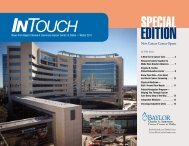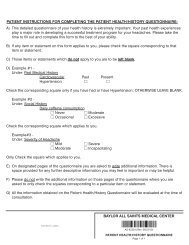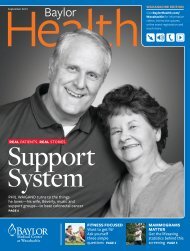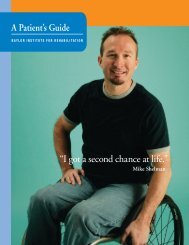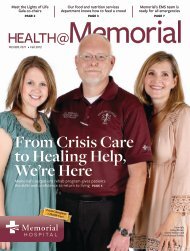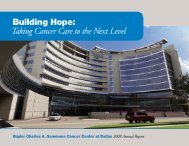Focused on the patient - Baylor Health Care System
Focused on the patient - Baylor Health Care System
Focused on the patient - Baylor Health Care System
Create successful ePaper yourself
Turn your PDF publications into a flip-book with our unique Google optimized e-Paper software.
<str<strong>on</strong>g>Focused</str<strong>on</strong>g> <strong>on</strong> innovati<strong>on</strong> 35Cancer research studies <strong>on</strong> <strong>the</strong> <strong>Baylor</strong> Dallas campusare c<strong>on</strong>ducted through <strong>Baylor</strong> Research Institute, MaryCrowley Medical Research Center, Texas Oncology,and US Oncology. In 2007, 267 <strong>on</strong>cology researchtrials were active at <strong>Baylor</strong> Dallas (see Table). Of those,68 were c<strong>on</strong>ducted through <strong>Baylor</strong> Research Institute,including 16 new studies approved in 2007. US Oncologyat <strong>Baylor</strong> Samm<strong>on</strong>s more than doubled <strong>the</strong>ir accrualsfrom 2006 (138) to 2007 (256), and finished 2007 as <strong>the</strong>top accruing locati<strong>on</strong>/site for <strong>the</strong> entire network.New Drugs in Kidney Cancerby Thomas E. Huts<strong>on</strong>, DO, PharmDBetween December 2005 and May 2007, <strong>the</strong> Food and DrugAdministrati<strong>on</strong> (FDA) approved three drugs that have been shownin clinical trials to improve progressi<strong>on</strong>-free survival in <strong>patient</strong>s withrenal cell carcinoma. <strong>Baylor</strong> Charles A. Samm<strong>on</strong>s Cancer Center atDallas was instrumental in bringing <strong>the</strong>se drugs to <strong>patient</strong>s throughcancer research trials managed by Texas Oncology. Thomas Huts<strong>on</strong>,DO, PharmD, an <strong>on</strong>cologist <strong>on</strong> <strong>the</strong> medical staff at <strong>Baylor</strong> Dallas,participated as a lead investigator <strong>on</strong> <strong>the</strong> phase III internati<strong>on</strong>alclinical trials that led to <strong>the</strong> FDA approval of sorafenib and sunitiniband most recently temsirolimus.“Sutent ® (sunitinib), Nexavar ® (sorafenib), and Torisel (temsirolimus)have improved clinical outcomes in randomized trials,” said Dr.Huts<strong>on</strong>. “These are <strong>the</strong> first new drugs approved for treatment ofadvanced renal cell cancer in almost two decades.”For years, <strong>the</strong> standard treatment for advanced kidney cancer wasinterfer<strong>on</strong>, which is effective in <strong>on</strong>ly about 15% of <strong>patient</strong>s andcauses flulike side effects, decreasing quality of life. There was noalternative—until now.TableOncology research studies offered through<strong>Baylor</strong> Samm<strong>on</strong>s Cancer Center in 2007Disease AreaResearch StudiesAdvanced carcinoma 4Bladder cancer 2Brain cancer 5Breast cancer 31Col<strong>on</strong> cancer 13Colorectal cancer 5Fallopian tube cancer 1General 10Head and neck cancer 6Hematologic malignancies 26Kidney cancer 9Leukemia 2Liver cancer 2Lung cancer 40Lymphoma 17Melanoma 39Myeloma 6Ovarian cancer 13Pancreatic cancer 19Prostate cancer 17Total 267Temsirolimus is a first-in-class drug and operates as an inhibitor of mTOR, or <strong>the</strong> mammaliantarget of rapamycin, which regulates cell growth and nutriti<strong>on</strong>. Sorafenib and sunitinib differin that <strong>the</strong>y target and inhibit vascular endo<strong>the</strong>lial growth factor and platelet-derived growthfactor, factors that tumor cells need to grow. These targeted <strong>the</strong>rapies d<strong>on</strong>’t have <strong>the</strong> side







